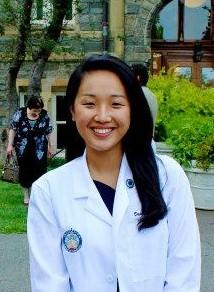Daisy Kim from Asian Pacific Medical Student Association

Daisy met with us on a chilly December Friday, but she immediately warmed to our conversation.
An International Perspective
She mentioned that she was originally “from South Korea but I grew up in China. My family immigrated to China and then I came to the states in high school as an exchange student to learn English as a sophomore.” Daisy began her undergraduate career studying international relations, but realized that her true passion is “cross-cultural communication.”
Psychology to Psychiatry
Deciding that psychology was a better fit, she pursued an internship at Children’s National Medical Center. “I worked with child psychologists and special-education teachers for children on the autism spectrum,” she said, “our team designed a school-based curriculum that improved executive functioning in these children, and I worked as a part-time special ed teacher at the Ivymount School in Maryland to pilot this curriculum.”
Her passion for psychology evolved into psychiatry and specifically child and adolescent psychiatry, informed by her love of working with children through having worked as a kindergarten teacher in South Korea and babysitting.
Daisy has pursued her passion for psychiatry outside of the medical classroom, even partnering with a psychiatrist at UCSF in conducting an epidemiological study of autism risk related to advancing parental age in South Korea.
Strength through Economic Adversity
“The scholarship I received to do this research is called AACAP, American Academy of Child and Adolescent Psychiatry. They funded my research over the summer and invited me to present at their annual conference in Texas. I was able to win this fellowship thanks to an entire team of wonderful friends here at GUSOM who helped me. My M2 classmates: Cassandra Baker e-mailed me about this fellowship opportunity, Daniel Kim and Jackie Lee proofread my application essays. My fellowship experience was especially meaningful because it was made possible with my friends’ support.
Daisy reflected on the difficulties students from lower socioeconomic statuses face. “As much as it sucks to worry about money when you would rather stay focused on studying, it gives you perspective. It allows you to take a step back and realize what a privilege it is to be able to be where you are – once you get in this mindset, stress about school starts to feel so small, so manageable.” She realized that “the modules that I had to write the most scholarship applications for I did the best at because that’s when I get the hungry mentality.”
Asylum Clinic Coordinator
Not one to walk away from a challenge, Daisy is also “a coordinator for the Asylum Clinic for Physicians for Human Rights.” She explained that, “the Asylum Clinic is for political refugees who come to the U.S. and seek asylum.” “There are a few other asylum clinics in the country, she admitted, “but Georgetown is the only school in the DMV area that has it.”
“One of the documents that a refugee needs in applying for asylum is a medical affidavit by a licensed clinician. The clinician performs a physical and/or psychological evaluation to provide documentation for trauma, psychological or physical, and it’s my job to recruit clinicians and coordinate their evaluations.”
When asked how she fits her coordinator position into her overflowing schedule, Daisy admitted that, “It’s a lot but it is also very rewarding. I would procrastinate on studying by working on asylum stuff!”
Mobilizing Korean Medical Students
Wrapping up our conversation, Daisy mentioned that she was heading to the Korean American Medical Association’s (KAMA) gala. She said that under KAMA’s mentorship, her and a few other medical students from George Washington University, University of Maryland, and Johns Hopkins University have recently established the Korean American Medical Student Association (KAMSA). Through this mission Daisy hopes to provide care “for Koreans in need, especially in many Virginia areas where there is a huge population of underserved Korean people.” Daisy is especially looking forward to advocating for psychiatric care because with the cultural stigma against mental health care, many immigrants and even first and second generation Koreans do not seek medical care that they would benefit from.
Still Having Fun
Asked to describe success, Daisy shared that, “I didn’t realize that medical school was going to be this fun! I define success as doing what I love and I have people who I love supporting me in everything that I do.”
